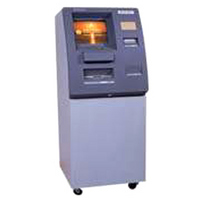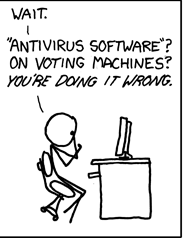
This is true, but misses the point:
If ordinary bank ATMs can be made secure and reliable, why can’t
electronic voting machines? It’s a simple enough question, but, sadly,
the answer isn’t so simple. Secure voting is a much more complex technical
problem than electronic banking, not least because a democratic election’s
dual requirements for ballot secrecy and transparent auditability are
often in tension with one another in the computerized environment. Making
ATMs robust and resistant to thieves is easy by comparison.
—
ATMs can fail, too:
It isn’t just voting machines.
Matt Blaze,
Exhaustive Search,
23 May 2008
Yes, and Lyndon Johnson stole a Senate race by ballot box stuffing
back in the days of all-paper ballots.
But that doesn’t change the simple fact that it’s far easier to
fiddle results with paperless electronic machines than it was with
paper ballots.
Or that an ATM failure tends to be very localized and limited,
while voting machines can be hacked in bulk.
Or that the results of a failed election can be
an unnecessary war, more than 4,000 U.S. dead, a million others dead,
quadrupled gas prices, $40+ trillion in debt, peak oil without
deployment of solar and wind, environmental crisis near or beyond tipping
point, and need I go on?
At what level of demonstrated risk does it become obvious that
waiting for perfect voting machines isn’t the right answer?
Fortunately,
some states have gotten the point already.
-jsq
 Twitter
recognizes that a network upgrade is important, but the role twitter
is playing in Iran is more important, and
reschedules for 1:30 AM Iranian time.
Now that’s risk management!
Twitter
recognizes that a network upgrade is important, but the role twitter
is playing in Iran is more important, and
reschedules for 1:30 AM Iranian time.
Now that’s risk management!

